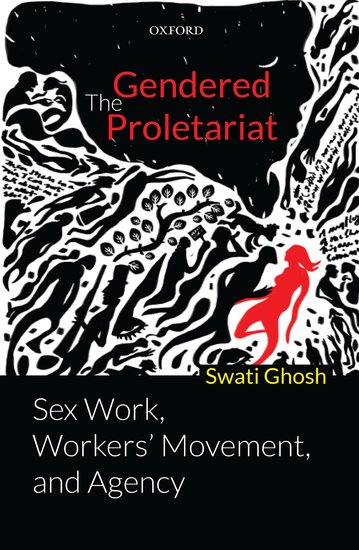
Prostitution and the Feminist Debate
A sex worker, as we know her today, is defined by work. She is socially useful reproductive labour: a gendered proletariat. The prostitute is neither a factory labourer nor a female wage worker to be termed as a proletariat; nor is she a domestic maid working at home. She is a woman out on the streets to rent out her body–sexuality–labour-power for money. A woman selling intimate sexual service, individually or in a brothel, to anonymous clients on sequential hire, and for payment. Naming her a gendered proletariat is in the context of inserting her in the labour process with the presupposition that women’s work is of non-productive value, and consequently, arriving at a confrontation with the question of what constitutes ‘work’ in prostitution. …The worker status of the sex worker, I believe, has to be understood in relation to the material basis of her work–labour-power, value-emergence and value-appropriation in sex work, social reproduction of women’s labour, and perspectives of affect, care, and sexual labour—incorporating both Marxist and feminist insights.
While the “prostitution question” occupies a significant space in feminist thinking, ‘the nature of prostitution as work is as yet under theorised.’ ( Rajeswari 2003 : 142 ). …
“This usage of the term ‘sex work’ marks the beginning of a movement.”1 The claim that prostitution is work has led the sex worker into a political struggle to negotiate her rights. The slogan “gatar khatiye khai, sramiker adhikar chai”— sex work is real work, we want worker’s rights—raised at the National Convention of Sex Workers in 1997 in Kolkata, has become an epitome of her struggle. …This is for the first time since the colonial period that we hear the voice of the prostitute. Previously she was a silent observer to male-mediated decisions about her. Today she is articulate and her “voice” has re-configured the idea of agency in work, indeed, which is but to satisfy male sexual desire. In this context, the corporeal–legal experiences of a sex worker constitutes her, as she constitutes the medico welfare discourse, parallel to the advent of AIDS in recent times.
(…)
Sex Work in Value Terms
There is a feminist trajectory to that of the post-Marxist scholars who have identified affective labour as one of the dominant labour forms that deploy women. Whether paid or unpaid, affective labour performed by a woman is embodied and often naturalised as feminine, implicit to which is the socially constructed gender division of work. The gendered division of labour has both economic and psychological consequences, since caring labour makes women less motivated to separate from others, and hence less likely to bargain or protest against gender inequality and exploitation ( Ferguson 1979 : 279–309, 1991 ). 11
(…)
As labour becomes immeasurable or beyond measure, the Marxian law of value loses its meaning and thus affective labour can no longer be expressed in terms of the classical homogeneous labour form—the industrial working class. This leads to a problem of applicability of traditional Marx’s value theory for the analyses of prostitution as a form of affective labour. If affective labour cannot be measured and becomes a misfit in the value frame, then neither can value nor exploitation of labour be approximated.
(…)
…Spivak’s deconstructive approach on the question of value [] shows a critique of exploitation of labour can still be valid without the Marxist categories of abstract labour and surplus-value (Spivak 1985 : 167). 14 In the deconstructive reading of the Marxist value chain, in Scattered Speculations on the Question of Value, Spivak points out the ambivalent status of use-value in Marx. In her reading of labour theory, when a commodity is exchanged, the concrete character of use-value is shed off, except as a prerequisite to exchange-value. Affective labour does not enter the circuit of exchange in the Marxian sense and remains outside without having to shed off the concrete character.
In other words, the socially reproductive prostitute labour produces use-value which takes the form of concrete labour of individuals providing sexual service to clients. A “labour in the bodily mode,” sex worker is not a wage labour even if hired by the brothel owner. To become a wage worker, the concrete character (of sexual labour) has to be shed to be equalised with other forms of impersonal, homogeneous, and abstract labour. The equalisation is achieved in becoming exchange-value, and not through mere monetary transaction. In sex work, the transformation of private labour into abstract labour cannot take place because it is the personal character that cannot be cast away and is, ultimately, the defining characteristic of the activity. The private use-value of prostitute labour, in general connotation, is referred to as work because a money payment is made. But, in spite of a monetary transaction, the private labour involved in the relational act can never become socially homogeneous labour. The private nature of the work prevents it from becoming socially homogeneous labour and therefore it cannot be equalized with any other labour or products of labour to attain exchange-value. Then, sex work has no exchange-value and a sex worker is not a member of the working class. Taking up the sphere of social reproduction, with affect as a new category of use-value, this book proceeds to examine the nature of work performed not in exchange-mediated but affect-mediated labour of women in prostitution. The housewife, in this category of affective labour, becomes another significant labour form. Sex work as the dual of housework involves body and sexuality-producing use-value but does not enter the circulation of capital as exchange value which the Marxist categories (abstract labour, surplus-value , or exploitation) fail to explain.
1. Carol Leigh, also known as Scarlot Harlot, a practitioner and activist, credited for inventing the term ‘sex work’ (see Nagle 1997 : 230).




